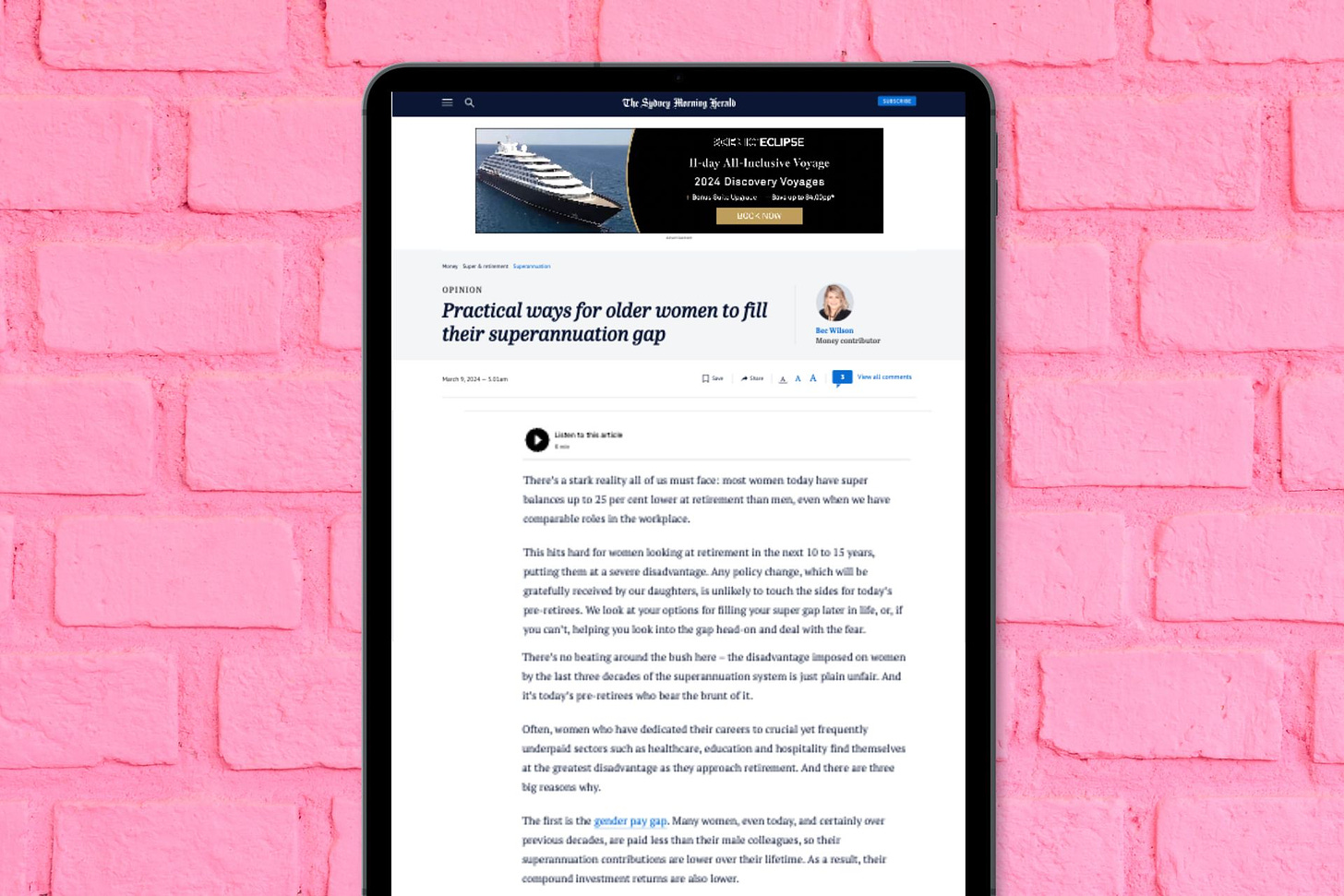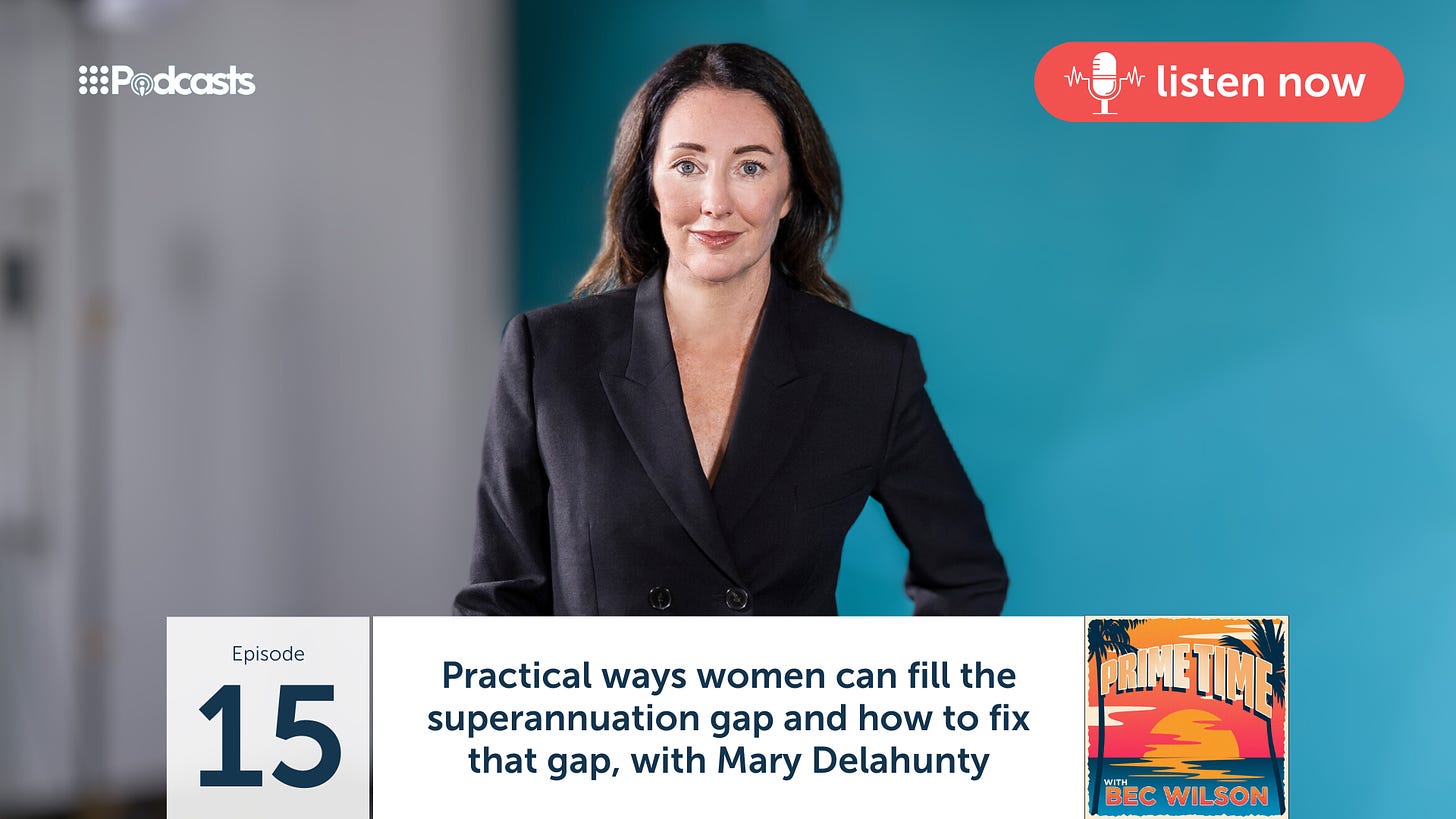Practical ways for older women to fill their superannuation gap
There’s no beating around the bush here – the disadvantage imposed on women by the last three decades of the superannuation system is just plain unfair. But there are a few steps we can take.
In this weekend edition
This is the short Sunday email, designed to bring you today’s article from The Sydney Morning Herald, The Age, WA Today and Brisbane Times. And today it’s all about women!
I’ve also included the terrific interview I did with Mary Delahunty, the CEO of the Association of Superannuation Funds Australia (ASFA) giving more mature women practical steps about how to fill their super gap.
Don’t forget my Epic Retirement Course kicks off MONDAY! (More info below!)
Have a lovely Sunday. Make it epic!
Many thanks! Bec Wilson
Author, podcast host, columnist, retirement educator, and guest speaker
There’s a stark reality all of us must face: most women today have super balances up to 25 per cent lower at retirement than men, even when we have comparable roles in the workplace.
This hits hard for women looking at retirement in the next 10 to 15 years, putting them at a severe disadvantage. Any policy change, which will be gratefully received by our daughters, is unlikely to touch the sides for today’s pre-retirees. We look at your options for filling your super gap later in life, or, if you can’t, helping you look into the gap head-on and deal with the fear.
There’s no beating around the bush here – the disadvantage imposed on women by the last three decades of the superannuation system is just plain unfair. And it’s today’s pre-retirees who bear the brunt of it.
Often, women who have dedicated their careers to crucial yet frequently underpaid sectors such as healthcare, education and hospitality find themselves at the greatest disadvantage as they approach retirement. And there are three big reasons why.
The first is the gender pay gap. Many women, even today, and certainly over previous decades, are paid less than their male colleagues, so their superannuation contributions are lower over their lifetime. As a result, their compound investment returns are also lower.
The second is the time we spend not working and not contributing to super. Many women take time out of the workplace to raise their children and care for ageing parents. This is a crucial role that we need people to play in society, and women shouldn’t be disadvantaged for doing so.
And the third is the lack of superannuation attached to maternity leave allowances, which the government has taken steps this week to tackle, announcing that superannuation would be paid on maternity leave provisions from July 1, 2025. It’s a good move, but it doesn’t help women staring at an existing gap.
So what can you do if you are an older woman facing retirement with a lower super balance?
Confront any fear and open your super fund statement. It might seem simple to say this. But many women with lower super balances admit feeling so hopeless about their super that they ignore looking at their statements and super fund’s emails and, as a result, they miss the opportunity to put themselves on a better path.
Mary Delahunty, chief executive of the Association of Superannuation Funds of Australia, said this is the first and possibly the most important step most women can take. “Don’t think that you are alone in the alarming numbers you may see. Take a deep breath … and face into it together with your super fund,” she says.
Read the rest of this article, on The Age, The Sydney Morning Herald, Brisbane TImes and WA Today.
Practical ways women can fill the superannuation gap with Mary Delahunty
The fight to help women level their superannuation up with their male counterparts requires a strong stance on two fronts. Practical help for today's retiring women and a battle for tomorrow's too.
In episode 15 of Prime Time we talk with the CEO of the Association of Superannuation Funds Australia (ASFA) Mary Delahunty about the practical ways that women with lower super balances can navigate their pre-retirement and retirement years, and optimise their position to achieve the best possible standards of living despite their disadvantaged super funds.
We also talk about the very important systemic changes needed in superannuation to prevent this problem in the future. Mary has some terrific ideas that policy advisers and governments might listen more to if the women’s voices around it were louder.
Mary Delahunty is a passionate advocate for women, fighting for the equal opportunity to build super fairly, and spends a huge amount of time campaigning the government to the challenges women face, more seriously.
In her role at ASFA, Mary Delahunty is one of the women who can really make a difference. So it’s a refreshing and entertaining conversation, perfectly timed for women’s day.
Listen now
LISTEN HERE - LATEST EDITION (E15) - OMNY
or listen on APPLE PODCASTS
FINAL CHANCE
The How to Have an Epic Retirement Flagship Course kicks off on Monday (11th March)!
Hundreds of people have booked for the upcoming How to Have an Epic Retirement Flagship Course. Launching TOMORROW 11th March, the course offers 8.5 hours of online lessons, and a practical 85 page workbook, dripped over 6 weeks; weekly live Q&As with some of the retirement industry’s most respected leaders, a community of people approaching retirement to learn with… and me - Bec Wilson, as your educator and coach! You also get a signed copy of the 2024 edition of the book! Find out more or register here. You can use the discount code EPIC25 to get 25% off the price this week.










